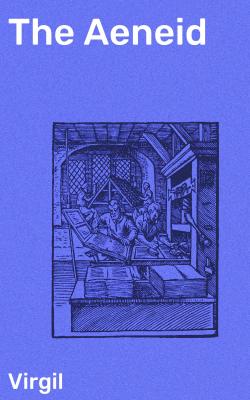The Aeneid. Публий Марон Вергилий
Читать онлайн.| Название | The Aeneid |
|---|---|
| Автор произведения | Публий Марон Вергилий |
| Жанр | Языкознание |
| Серия | |
| Издательство | Языкознание |
| Год выпуска | 0 |
| isbn | 4057664188922 |
My death is wanting to conclude the night.’
Arm’d once again, my glitt’ring sword I wield,
While th’ other hand sustains my weighty shield,
And forth I rush to seek th’ abandon’d field.
I went; but sad Creusa stopp’d my way,
And cross the threshold in my passage lay,
Embrac’d my knees, and, when I would have gone,
Shew’d me my feeble sire and tender son:
‘If death be your design, at least,’ said she,
‘Take us along to share your destiny.
If any farther hopes in arms remain,
This place, these pledges of your love, maintain.
To whom do you expose your father’s life,
Your son’s, and mine, your now forgotten wife!’
While thus she fills the house with clam’rous cries,
Our hearing is diverted by our eyes:
For, while I held my son, in the short space
Betwixt our kisses and our last embrace;
Strange to relate, from young Iulus’ head
A lambent flame arose, which gently spread
Around his brows, and on his temples fed.
Amaz’d, with running water we prepare
To quench the sacred fire, and slake his hair;
But old Anchises, vers’d in omens, rear’d
His hands to heav’n, and this request preferr’d:
‘If any vows, almighty Jove, can bend
Thy will; if piety can pray’rs commend,
Confirm the glad presage which thou art pleas’d to send.’
Scarce had he said, when, on our left, we hear
A peal of rattling thunder roll in air:
There shot a streaming lamp along the sky,
Which on the winged lightning seem’d to fly;
From o’er the roof the blaze began to move,
And, trailing, vanish’d in th’ Idaean grove.
It swept a path in heav’n, and shone a guide,
Then in a steaming stench of sulphur died.
“The good old man with suppliant hands implor’d
The gods’ protection, and their star ador’d.
‘Now, now,’ said he, ‘my son, no more delay!
I yield, I follow where Heav’n shews the way.
Keep, O my country gods, our dwelling place,
And guard this relic of the Trojan race,
This tender child! These omens are your own,
And you can yet restore the ruin’d town.
At least accomplish what your signs foreshow:
I stand resign’d, and am prepar’d to go.’
“He said. The crackling flames appear on high.
And driving sparkles dance along the sky.
With Vulcan’s rage the rising winds conspire,
And near our palace roll the flood of fire.
‘Haste, my dear father, (’tis no time to wait,)
And load my shoulders with a willing freight.
Whate’er befalls, your life shall be my care;
One death, or one deliv’rance, we will share.
My hand shall lead our little son; and you,
My faithful consort, shall our steps pursue.
Next, you, my servants, heed my strict commands:
Without the walls a ruin’d temple stands,
To Ceres hallow’d once; a cypress nigh
Shoots up her venerable head on high,
By long religion kept; there bend your feet,
And in divided parties let us meet.
Our country gods, the relics, and the bands,
Hold you, my father, in your guiltless hands:
In me ’tis impious holy things to bear,
Red as I am with slaughter, new from war,
Till in some living stream I cleanse the guilt
Of dire debate, and blood in battle spilt.’
Thus, ord’ring all that prudence could provide,
I clothe my shoulders with a lion’s hide
And yellow spoils; then, on my bending back,
The welcome load of my dear father take;
While on my better hand Ascanius hung,
And with unequal paces tripp’d along.
Creusa kept behind; by choice we stray
Thro’ ev’ry dark and ev’ry devious way.
I, who so bold and dauntless just before,
The Grecian darts and shock of lances bore,
At ev’ry shadow now am seiz’d with fear,
Not for myself, but for the charge I bear;
Till, near the ruin’d gate arriv’d at last,
Secure, and deeming all the danger past,
A frightful noise of trampling feet we hear.
My father, looking thro’ the shades, with fear,
Cried out: ‘Haste, haste, my son, the foes are nigh;
Their swords and shining armour I descry.’
Some hostile god, for some unknown offence,
Had sure bereft my mind of better sense;
For, while thro’ winding ways I took my flight,
And sought the shelter of the gloomy night,
Alas! I lost Creusa: hard to tell
If by her fatal destiny she fell,
Or weary sate, or wander’d with affright;
But she was lost for ever to my sight.
I knew not, or reflected, till I meet
My friends, at Ceres’ now deserted seat.
We met: not one was wanting; only she
Deceiv’d her friends, her son, and wretched me.
“What mad expressions did my tongue refuse!
Whom did I not, of gods or men, accuse!
This was the fatal blow, that pain’d me more
Than all I felt from ruin’d Troy before.
Stung with my loss, and raving with despair,
Abandoning my now forgotten care,
Of counsel, comfort, and of hope bereft,
My sire, my son, my country gods I left.
In shining armour once again I sheathe
My limbs, not feeling wounds, nor fearing death.
Then headlong to the burning walls I run,
And seek the danger I was forc’d to shun.
I tread my former tracks; thro’ night explore
